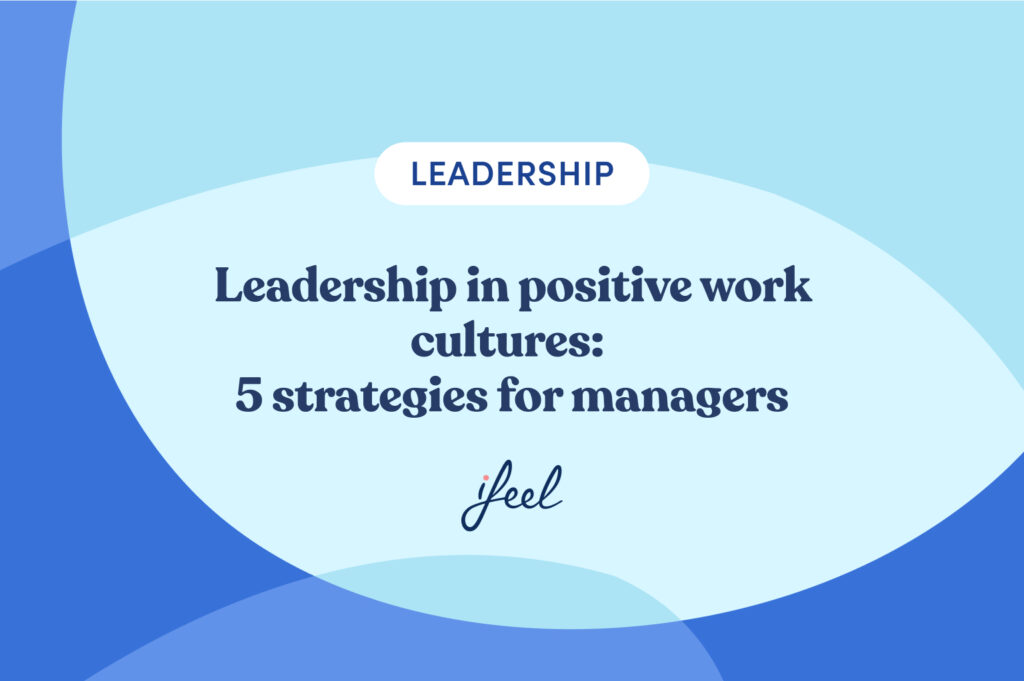The influence of leadership in positive work cultures extends beyond strategic decision-making to the way in which leaders intentionally shape behaviours and values that define an organisation’s character and atmosphere.
Through their day-to-day actions, leaders set standards that guide how employees interact, communicate, and feel in the workplace. This role is crucial, as it enables leaders to inspire their team to achieve the company’s goals and cultivate an environment conducive to personal and professional development.
By taking a conscious and deliberate approach, leaders can architect a work culture that promotes resilience, inclusion, and holistic well-being.
To assist in this process, ifeel has designed a must-have resource for fostering a positive culture in your organisation. Discover effective strategies to improve the work environment and enhance the well-being of your employees. Don’t miss out. Download it for free now!
The importance of leadership in positive work cultures
The role of leadership in positive work cultures is vital to building an organisational culture that promotes well-being and productivity. In a corporate environment, leaders are not only responsible for leading teams towards achieving goals, but also for shaping the work environment in which their team members operate.
Leadership in positive work cultures is based on principles such as honest communication, mutual respect, and the implementation of values that foster collaboration and well-being for all employees. Of course, a positive company culture translates into direct benefits for the organisation: studies have shown that companies with strong cultures report revenues up to four times higher than those with weak cultures.
In this sense, leaders who actively promote these values and practices not only better manage the demands of the work environment but also create an environment where employees feel valued and motivated. This is crucial to maintaining a dynamic and resilient work environment where every team member can thrive and contribute to the common mission of the organisation.
Strategies to foster a positive leadership culture
Implementing effective strategies is essential for leadership in positive work cultures to strengthen and sustain an organisational culture that promotes collective well-being.
These strategies help establish a healthy work environment and ensure that the organisation’s values are lived out daily. Below are vital methods leaders can adopt to cultivate and sustain this culture in their teams.
1. Assessing leadership style
As managers, regularly assessing our leadership style is crucial to ensuring that current practices are aligned with the goals of a positive culture. Leaders can benefit from reflecting on their approach, soliciting team feedback, and participating in personal development programmes.
This constant self-assessment allows them to identify areas for improvement and adjust practices to strengthen the positive impact on the work environment. You can use the following exercise to help you get started:
Practical exercise to assess our leadership style.
This exercise will help leaders assess the current culture and identify areas for improvement:
| Question | Yes | Sometimes | No |
|---|---|---|---|
| Would you describe communication in your team as open and honest? | |||
| Do you receive regular feedback on your performance? | |||
| Do you consider most of your actions to be aligned with organisational values? | |||
| Does your team often come to you for support? | |||
| Do you have training and development opportunities to improve your leadership style? |
This questionnaire allows leaders to get a clear picture of how the current culture is perceived within the organisation and the steps needed to improve it, from their leadership role.
2. Open and honest communication
One of the fundamental pillars of effective leadership in positive work cultures is open communication, which is a powerful tool for transforming and empowering organisations. Leaders must establish clear and accessible channels for all employees to express their concerns and expectations.
This improves team cohesion and fosters an environment of trust and respect.
3. Model desired behaviour
Leaders should be living examples of the values the organisation wishes to promote. This means acting with integrity, showing respect in daily interactions, and effectively communicating organisational values.
“Organisations are not just production centres; they are living entities in which everyone can and should participate, supporting the colleague next to them. When a person feels that they are in a positive and healthy environment, where they are valued, they come to work with joy, energy and a desire to contribute to the organisation that provides them with that environment’.
Vasco Armés, Human Resources Director of PERI Iberia, an ifeel partner company.
4. Implementation of training programmes
It is essential that employees receive appropriate training so that they can align their behaviour with organisational values.
Development programmes should focus on skills such as effective communication, conflict resolution and leadership. These programmes empower employees and reinforce the positive culture you want to establish.
‘Leadership is about attracting and retaining the best people by providing opportunities for professional and personal growth and development. Be an example in how you act, leading openly and honestly the capabilities of your teams in growth projects’.
Carlos Romero-Camacho Silos, Chief People & Corporate Affairs Officer at Insud Pharma, an ifeel partner company.
5. Incentives and recognition
Recognition of behaviours aligned with the company’s values is crucial to maintain a positive culture. Designing a job recognition strategy that values these behaviours reinforces employee engagement and promotes the adoption of desirable practices. This is vital to ensure that the work culture remains a constant guide.

Trust the leaders
At ifeel, we know that leadership in positive work cultures is a powerful tool for transforming and empowering organisations. With the right leadership, it is possible to unlock the latent potential in every team member and achieve sustained long-term success.
To assist in this process, ifeel has designed a key resource to help you foster a positive culture in your organisation. Discover effective strategies to improve the working environment and enhance the well-being of your employees. Don’t miss out. Download it for free now!
With our mental well-being solution, your company’s HR managers can receive personalised, data-driven advice on improving mental health at work. In addition, this solution offers employees a 360° mental well-being service structured at different levels according to their needs. Try our solution now to see how it could help you.
We hope you found this article on leadership in positive work cultures interesting. If you would like more information about our mental well-being solution for companies, simply request it, and we will contact your team as soon as possible.










